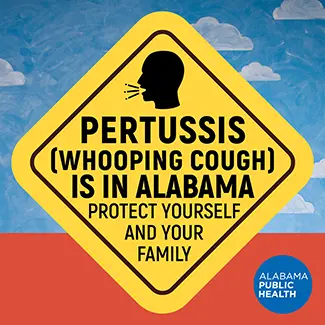
Immunization
Bureau of Communicable Disease
Font Size:
- Immunization Home
- ImmPRINT
- Immunization Quality Improvement for Providers (IQIP)
- Vaccines for Children Program
- Case Counts
- Measles Disease
- Outreach and Education
- Vaccine Information
- School Entry Survey
- Immunization Resources
- Alabama Adolescent And Adult Vaccination Task Force
- Data Requests
- Contact Us
Whooping Cough (Pertussis)
What is Pertussis Disease (Whooping Cough)?
- Pertussis, also known as whooping cough, is a highly contagious bacteria respiratory disease.
- Pertussis is known for uncontrollable, violent coughing, often making breathing hard.
- After coughing fits, someone with pertussis often needs to take deep breaths, which results in a "whooping" sound.
- Pertussis can affect people of all ages but can be very serious, even deadly, for babies less than a year old.
- Pertussis is a highly contagious disease and can affect up to 80% of household contacts.

What are the symptoms?
- Symptoms of pertussis usually develop within 5 to 10 days after exposure but may not develop for as long as 3 weeks.
- In the first week or two, early symptoms may include:
--Subtle onset of runny nose.
--Low-grade fever.
--Sneezing.
--Mild, occasional cough.
--Apnea or stop breathing when asleep. - After 1 to 2 weeks, symptoms may include:
--Fits of many rapid coughs followed by a high-pitched "whoop" sound.
--Throwing up during or after coughing fits.
--Very tired after coughing fits.
How does Pertussis spread?
- Pertussis is spread from person to person.
--Coughing and sneezing.
--Spend much time near one another and share breathing space.
--Some babies get pertussis from older siblings, parents, or caregivers who might not even know they have the disease. - The best prevention for pertussis is the vaccine, but no vaccine is 100% effective.
Who should get the pertussis vaccine?
- There are 2 vaccines that protect against pertussis. DTaP for children up to 6 years of age and Tdap for people 7 years of age and older.
- People who have not been vaccinated and are in contact with a baby.
- Babies beginning at 2 months of age, followed by a total of five doses through age 4-6 years.
- Adolescents aged 11 through 18 years should receive a single Tdap.
- Adults aged 19 through 64 years should receive a single Tdap.
- Pregnant women should receive a Tdap for each pregnancy.
- Anyone who has not received the full five doses of pertussis vaccine.
- Either if you are exposed to pertussis and/or have the disease, you should still receive a vaccine containing pertussis.
- All adults are recommended one dose of Tdap as soon as possible, especially if pregnant or in close contact with infants.
What are the vaccine side effects and risks?
- Mild (common) problems after the vaccine may include:
--Fever.
--Pain, redness, and/or swelling where the shot was given.
--Local reactions such as pain, redness, or swelling.
--Drowsiness, fretfulness.
--Tiredness. - Moderate (uncommon) problems after the vaccine may include:
--Seizure (jerking or staring).
--Non-stop crying, for 3 hours or more.
--High fever, over 105ºF. - Severe (very rare) problems after the vaccine may include:
--Serious allergic reaction.
CDC Resources
Page last updated: February 2, 2026




